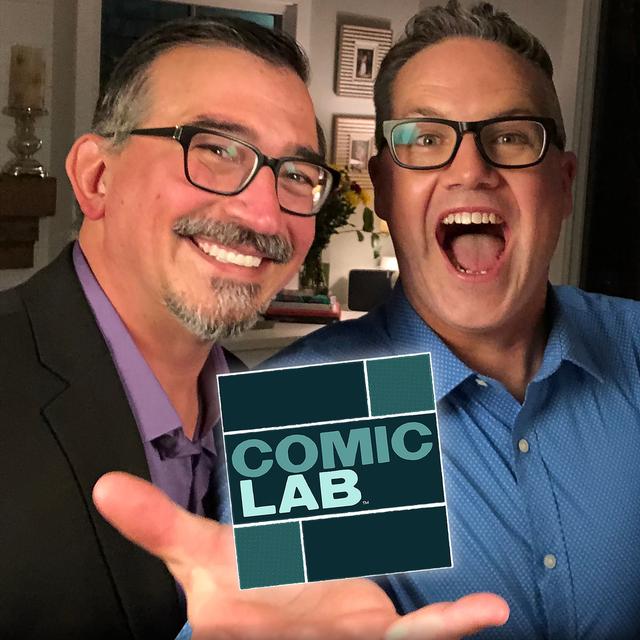
Episode description
It's a jam-packed show this week! Brad and Dave argue over the better delivery for story exposition — dialogue or narration. Dave is discontinuing international shipping; Brad gets his Wikipedia updates; and the guys agree that Dee Fish does autobio comics right. Then Dave does another behind-the-scenes analysis of his recent Kickstarter, talking about his pricing strategy for stretch goals and how they processed hundreds of images for the campaign. Finally, with the SFWA opening their membership to comic creators, they discuss whether they should join.
Today's show
- Narration or Dialogue?
- Susan McTaggart's personal affirmation
- UPDATE: international shipping
- UPDATE: Brad's Wikipedia page
- UPDATE: Autobio comics done right: Finding Dee
- Dave's Kickstarter Stretch Goals
- Dave's Kickstarter images
- SFWA membership
Summary
In this episode, cartoonists Dave Kellett and Brad Guigar focus on the debate between using narration boxes versus dialogue. Brad Guigar emphasizes the importance of comfort in storytelling choices, while both hosts explore the emotional impact of narration and its evolution in comics. They encourage creators to follow their instincts and prioritize compelling storytelling. Brad Guigar and Dave Kellett discuss various aspects of storytelling, community engagement through Patreon, the challenges of international shipping for comic creators, the significance of meaning in autobiocomics, and strategies for successful Kickstarter campaigns. They emphasize the importance of creative choices, the impact of community support, and the complexities of shipping logistics in the comic industry. Dave Kellett discusses the intricacies of managing Kickstarter campaigns, mainly focusing on stretch goals and the importance of planning. They emphasize the need for careful consideration when adding new items during a campaign and the potential complications that can arise. The discussion then shifts to preparing images for Kickstarter, highlighting the significant amount of work involved in creating marketing materials. Finally, they explore the relevance of the Science Fiction and Fantasy Writers Association (SFWA) to comic creators, sharing their thoughts on community and the changing landscape of the sci-fi genre.
Takeaways
- Dave shares a humorous personal anecdote about food poisoning.
- Choosing between narration and dialogue is a key decision for comic creators.
- Comfort in storytelling choices is crucial for new writers.
- Narration can impact the emotional flavor of a story.
- There is no wrong choice in narrative style; follow your gut.
- The evolution of comic narration reflects changing storytelling trends.
- Narration boxes can add depth but may also create rigidity.
- The importance of pacing in storytelling is discussed.
- Creativity should guide the use of narration and dialogue. Creative choices in storytelling can enhance narrative depth.
- Engaging with the community through platforms like Patreon fosters support.
- International shipping poses significant challenges for comic creators.
- Autobiocomics should convey meaning beyond just events.
- Successful Kickstarter campaigns require strategic planning and stretch goals.
- Understanding shipping costs is crucial for international sales.
- Community feedback can improve personal branding and visibility.
- Autobiocomics can be done right by providing emotional context.
- Stretch goals should be carefully calculated to ensure profitability.
- Gamification of Kickstarter goals can drive excitement and engagement. Don't add stretch goals during an active Kickstarter campaign.
- Plan all stretch goals before launching the campaign.
- Physical items as stretch goals can complicate logistics.
- Create paper-based stretch goals to simplify fulfillment.
- Image preparation is crucial for a successful Kickstarter.
- Over 200 images may be needed for a Kickstarter campaign.
- Marketing images should be tailored for different platforms.
- SFWA's opening to comic creators is a positive change.
- Community support is vital for independent creators.
- Ownership of work is essential for creative freedom.
You get great rewards when you join the ComicLab Community on Patreon
- $2 — Early access to episodes
- $5 — Submit a question for possible use on the show AND get the exclusive ProTips podcast. Plus $2-tier rewards.
If you'd like a one-on-one consultation about your comic, book it now!
Brad Guigar is the creator of Evil Inc and the author of The Webcomics Handbook. Dave Kellett is the creator of Sheldon and Drive.